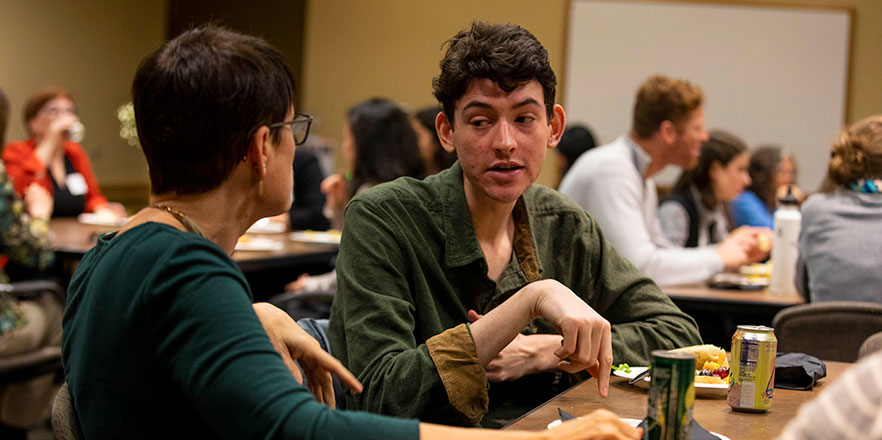New Consulting Corps Benefits Nonprofits, Students Equally
By Savannah Tranchell

Matt Levy '20 had his first experience working with nonprofits last summer during an internship in the office of Los Angeles Mayor Eric Garcetti.
Levy was assisting with Garcetti's Great Streets Initiative, which works to revitalize neighborhoods through improving sections of street or intersections. Levy, an economics and art history major at Whitman College, worked with nonprofits in the selected communities to help identify what sort of improvements would help - from repairing sidewalks to installing art that represented the culture of the area.
When he received an email from the Student Engagement Center in August inviting students to apply for a new program working with nonprofits, he was eager to learn more and build on his internship experience.
Levy is now one of seven students working in Whitman's Consulting Corps. Funded by a $231,000 Core Grant from the Sherwood Trust, the Consulting Corps is a three-year pilot program that brings benefits to both area nonprofits and Whitman students, said Shelly Rasmussen, the community consulting specialist in the Student Engagement Center (SEC) who oversees the corps.
Rasmussen joined the SEC staff in August, and brings more than 25 years of experience working in higher education and nonprofits.
"The basic goal of the corps is to provide high-level, really broad-based management consulting to nonprofit organizations in the Walla Walla area," she said. For the first year, the goal was to partner with five nonprofits, increasing to 10 for years two and three. This year, they ended up with seven partners, which provide services from health care to addiction recovery to arts to education.
Each nonprofit is paired with a student, who works with them and Rasmussen to lead a self-assessment conversation and identify areas of priorities. The Consulting Corps is using a self-assessment tool provided by 501 Commons that guides the organization through five areas of a healthy nonprofit: Governance and boards; fundraising and financial management; communications and relationships; planning, technology and administration; and management and culture.
After completing the self-assessment, the organization leadership and staff meet with the Consulting Corps team to talk about their results. The student then works on crafting a proposal that helps the nonprofit prioritize the areas they need to focus on to maintain a healthy organization.
It's a process all nonprofits can benefit from, said Becky Turner, executive director of The STAR Project in Walla Walla, which was one of the first groups to sign on with the Consulting Corps. STAR assists people with felony convictions as they work to successfully re-integrate with society after being released from prison.
This year, STAR is conducting work on its strategic plan, so the opportunity to participate in the Consulting Corps was particularly appealing, Turner said.
"This is an opportunity for college students who want to be involved in things like this to take the work right off my plate and leave me to do other things, like find organizational funding," she said.
It will also allow Turner to better understand the needs and priorities of her staff.
"I want to know what is the most important thing to focus on. What's the second most important thing?" she said. "What I think, and what my staff thinks, it's not always the same thing. Staff members are generally working on the line item things, day-to-day operations. This is an opportunity for us to figure out where we're thinking the same, where we're thinking differently, and ultimately, how to position the organization for success in the coming years."
While the corps' mission to strengthen nonprofits in the Walla Walla Valley may seem purely altruistic, the experience also brings plenty of value to the students participating. Consulting is an increasingly interesting career field for students, Rasmussen said, and liberal arts students are well prepared to enter it.
"I believe that liberal arts education reinforces a wonderful set of skills, such as critical thinking and understanding the intersectionality of a lot of different ideas and disciplines," Rasmussen said. "A lot of students in different majors are thinking about consulting. I think an art history major could be a great consultant. A math major can be an incredible consultant. This gives students the opportunity to understand and work on consulting projects and have that first-hand knowledge."
Levy is drawn to the idea of consulting, and was excited to spend the year working with Carnegie Picture Lab, a program that brings arts education to public schools in Walla Walla.
"I think consulting is a good kind of all-encompassing liberal arts career," he said. "Consulting can be anything. It's not a very narrow or technical skill set. That's where I can thrive - I like brainstorming, I like being creative."
The students in the corps are developing critical skills for the modern workforce, Rasmussen said, like learning how to prepare for meetings, how to present, how to identify and ask the right questions - the ones that help you as a consultant so you can help the organization.
"That's the core of consulting," she said. "We lead an organization through something they already know they want to work on."
For her part, Turner can see the relevance to what the students are learning, and the value they are bringing to agencies like The STAR Project.
"I think it's going to broaden their horizons, and help them to realize the working world outside of college is very large, and there are lots of different opportunities for employment," she said.